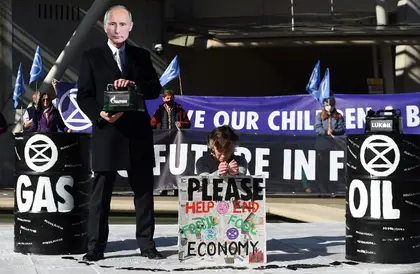The use of energy as a weapon is Putin’s strategy. This is well known to Ukraine, which has lived through his gas wars. The weapon worked for a long time. Take, for instance, the 2009 Tymoshenko-Putin gas supply contract – an economic noose on Ukraine that for years allowed Putin to dictate political terms.
But everything changed after 2014. Ukraine broke the noose of energy dependence on Russia when Kyiv stopped buying natural gas from Gazprom. The secret is simple: no compromise with the aggressor country.
JOIN US ON TELEGRAM
Follow our coverage of the war on the @Kyivpost_official.
One might say that Ukraine’s experience of gas wars could be very useful for other countries.
Putin’s first energy war: infrastructure
The first one is against Ukraine’s energy infrastructure, and it looks like it has been a total failure. Russia has spent enormous resources to plunge Ukraine, or at least Kyiv, into darkness and freezing cold. We’re at the end of February now and there is no power shortage in Ukraine’s grid and no limitations on power supply to households. There are still limitations for businesses, but as daylight hours grow longer, more limitations will be lifted. Moreover, the resumption of electricity export is already being contemplated.
Meanwhile, Putin’s missile strike capacities are dwindling. Ukraine’s air defense potential is growing and will be even higher with the arrival of Patriot systems, whereas Russia is increasingly short of missiles.

Moscow Claims AFU’s Best Troops ‘Ground Down’, Kyiv’s 2025 War Plans ‘Derailed’
Ukrainian macroeconomists are already thinking about revising their forecasts for 2023 with calculations based on zero shortage of electricity.
Formidable resources have been spent only to unnerve Ukrainians who will have to think after the war about what to do with the huge number of power generators and other equipment they have bought to weather blackouts.
Putin’s second energy war: gas
The second gas war is against Europe. Putin has lost that one as well. Russian propaganda has promised so many times that Europe would freeze. Russian officials claimed and predicted exorbitant prices of Russian natural gas in the EU.
But what do we see? The winter is not over yet, and the price of gas in the EU is lower than last year. Instead of the $5,000 per 1,000 cubic meters predicted by Russia, it is sold there at around $500. From the 10-year perspective gas prices still look high, but they are clearly stabilizing.
And nobody has frozen.
As for Gazprom, it has lost its biggest and the world’s most solvent market, which cannot be replaced in the short term because Gazprom does not have the infrastructure to redirect its gas flows. For centuries, Russia’s trade infrastructure, including trade in energy resources, has been Europe-bound.
Gazprom has lost this market for a long time, if not for good. The shotgun on the wall, which Putin had always threatened to fire at Europe, turned out to be loaded with blanks. Now nobody is afraid of it.
Putin’s third energy war: oil
Oil is the key contributor to Russia’s warfare capabilities. The Russian economy lived through 2022 with minimal losses, primarily thanks to record-high revenues from energy exports. The money that poured into the country from buyers of its oil and natural gas prevented it from collapsing under the blow of sanctions. Moreover, it saw an increase in investment, which looks abnormal, considering the sanctions and the record outflow of capital and human resources.
But this year money is not going to pour in as easily as before. In January 2023, Russia earned twice less from selling energy resources than in January 2022, plus there are sanctions that will only become tougher.
There is nothing Russia can do about it. After the latest oil embargos and limitations on oil products, the Kremlin gave an order to reduce daily oil extraction by 500,000 barrels, which makes a 5 percent reduction from 11 million barrels.
And this may well be the first step.
The Kremlin must have figured that the reduction would lead to a growth in oil prices, which would balance out the losses and hit the inflation-ridden Western economies. But a week after the oil extraction reduction was announced, the prices are even lower. So, this shotgun misfired, too.
Putin has not lost his oil war yet, but is striding toward the defeat. The West sees its plan working and Russia losing profit on the stable oil market.
That is how the power of Russia’s energy weapon turns out to be zilch – just like the power of its “mighty” army.
The views expressed in this opinion article are the author’s and not necessarily those of Kyiv Post.
You can also highlight the text and press Ctrl + Enter






